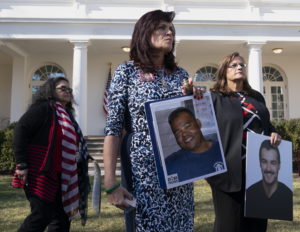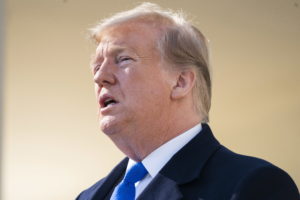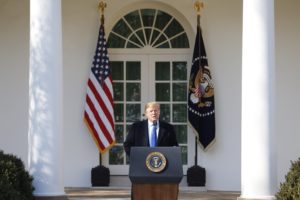
Washington, Feb 15 (EFE).– President Donald Trump declared a national emergency on Friday with the goal of bypassing Congress and securing billions of dollars in additional funding to build a wall on the United States’ border with Mexico.
In remarks at the White House, Trump said the move was necessary to stop an “invasion of our country with drugs, with human traffickers, with all types of criminals and gangs.”
The president, however, also said he foresees lawsuits and a tough battle in the courts in trying to get the wall built.
“We will possibly get a bad ruling. And then we’ll get another bad ruling. And then we’ll end up in the Supreme Court, and hopefully we’ll get a fair shake,” he said.
In tandem with the emergency declaration, Trump also is to sign a $333 billion package of seven spending bills that was approved Thursday by wide margins in both the Democrat-controlled House of Representatives and the Republican-controlled Senate.
In doing so, he will avert a new partial government shutdown that had been scheduled to begin at 12.01 am on Saturday.
“President Trump will sign the government funding bill, and as he has stated before, he will also take other executive action – including a national emergency – to ensure we stop the national security and humanitarian crisis at the border,” White House Press Secretary Sarah Huckabee Sanders said in a statement Thursday.
A previous shutdown resulted in the partial paralysis of about a quarter of the government for 35 days starting Dec. 22, affecting some 800,000 of the 2.1 million federal workers.
On Monday, congressional Republicans and Democrats reached a budget accord that included $1.375 billion to build about 88.5 kilometers (55 miles) of physical barriers (steel bollard fencing) on the US-Mexico border.
But Trump, who had been seeking $5.7 billion in wall funding, said that he was not pleased with the results of the negotiations.
Earlier Friday, the White House said Trump plans to use around $8 billion to build the wall.
That total will include the just under $1.38 billion from the Homeland Security appropriations bill that Congress passed on Thursday, while the remaining $6.6 billion in funds is to be shifted from other programs as part of executive actions and a national emergency declaration.
Trump’s plan is to use $3.5 billion from the Defense Department’s military construction budget, $2.5 billion from that department’s drug interdiction program and $600 million from the Treasury Department’s drug forfeiture fund to supplement the funding approved by Congress.

Trump’s pledge to build a wall to put a stop to illegal immigration is considered priority No. 1 by his core group of supporters and was a key factor in his surprise victory in the 2016 presidential election.
Democrats, however, have blasted Trump’s plans to move money around without congressional approval and say there is no emergency on the US’s southern border.
Trump’s fellow Republicans, meanwhile, say invoking an national emergency to build the wall creates a dangerous precedent because a future Democratic president could take similar action in the future if his or her priorities were blocked by Congress.
The president, however, downplayed his decision to take that course.
“I’m going to be signing a national emergency, and it’s been signed many times before, by many presidents. It’s rarely been a problem … nobody cared,” Trump said.
Trump cita “invasión” en frontera para justificar su decreto sobre el muro
Washington, 15 feb (EFE).- El presidente, Donald Trump, citó hoy una supuesta “invasión” al país con “drogas y tráfico de personas” para justificar su recurso a una declaración de “emergencia nacional” para reunir unos 8.000 millones de dólares para financiar la construcción de un muro en la frontera con México.
“Hoy voy a firmar una emergencia nacional (para conseguir fondos para el muro) (…) porque estamos hablando de una invasión de nuestro país con drogas, con tráfico de personas”, dijo Trump en una conferencia de prensa en la Casa Blanca.
“Tenemos la oportunidad de acercarnos a 8.000 millones de dólares, y con eso vamos a construir mucho muro”, prometió.
Trump precisó que rubricaría ese decreto en cuanto terminara la rueda de prensa, y aseguró que prevé que la oposición demócrata le “demande” ante los tribunales para bloquear la medida, aunque pronosticó que ganará la batalla judicial.
“Anticipo que me demandarán, aunque no deberían demandarme”, afirmó el mandatario, y agregó que el litigio acabará seguramente en el Tribunal Supremo, como ocurrió con la pugna judicial sobre su veto migratorio contra los ciudadanos de varios países de mayoría musulmana.
“Lo que pasará, tristemente, es que nos demandarán, tristemente habrá un proceso (judicial), y felizmente, ganaremos”, subrayó.

La declaración de emergencia nacional permite a los presidentes acceder a una prerrogativa temporal y especial para hacer frente a una crisis, y la oposición demócrata considera que Trump está abusando de su poder al recurrir a ello para reunir fondos, dado que el Congreso tiene la potestad exclusiva en materia presupuestaria.
Según la Casa Blanca, el recurso de Trump a esa medida ejecutiva le permitiría desviar 6.600 millones de dólares en otras partidas presupuestarias de los Departamentos del Tesoro y de Defensa para dedicarlos a la construcción de una barrera fronteriza.
Junto a los 1.375 millones aprobados por el Congreso, la Casa Blanca conseguiría así casi 8.000 millones de dólares, con los que busca erigir unos 376 nuevos kilómetros (234 millas) de una barrera fronteriza que estaría formada por postes de acero, y no sería, por tanto, un muro de hormigón.
Trump aprovechó además su discurso para “agradecer al presidente” de México, Andrés Manuel López Obrador, por su “ayuda con las monstruosas caravanas (de inmigrantes indocumentados) que han ido viniendo” hacia el país desde Centroamérica, atravesando territorio mexicano.
El mandatario también reiteró que le gustaría firmar “una reforma migratoria sustancial”, pero solo hizo referencia a sus prioridades -como la de acabar con el proceso por el que los residentes permanentes pueden ayudar a sus familiares a emigrar al país- y no a una posible regularización de los indocumentados.
